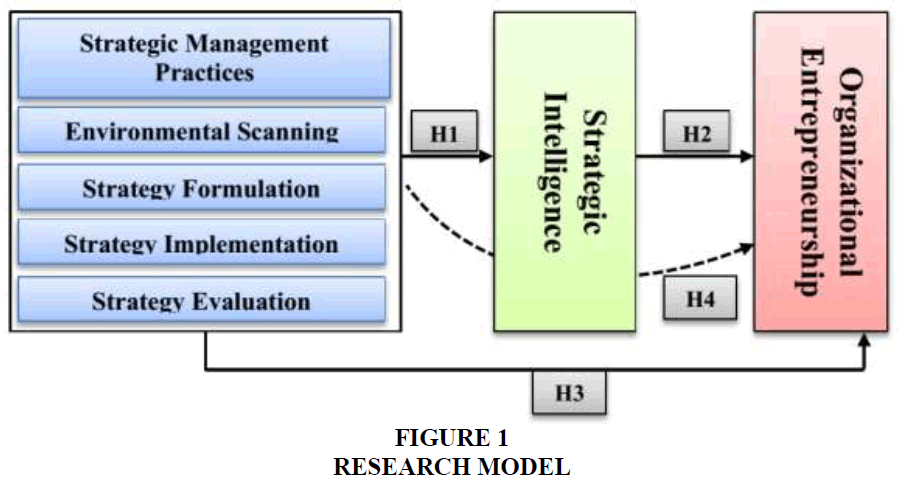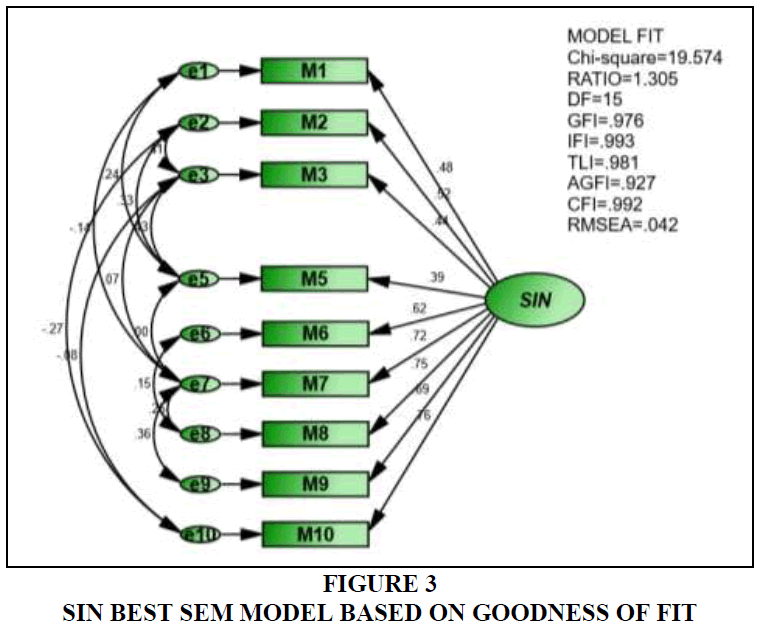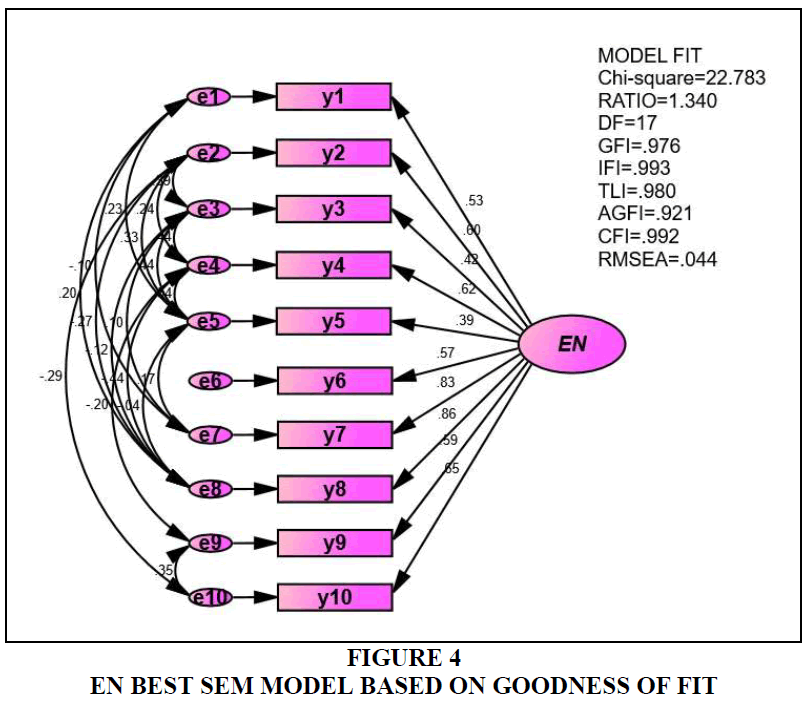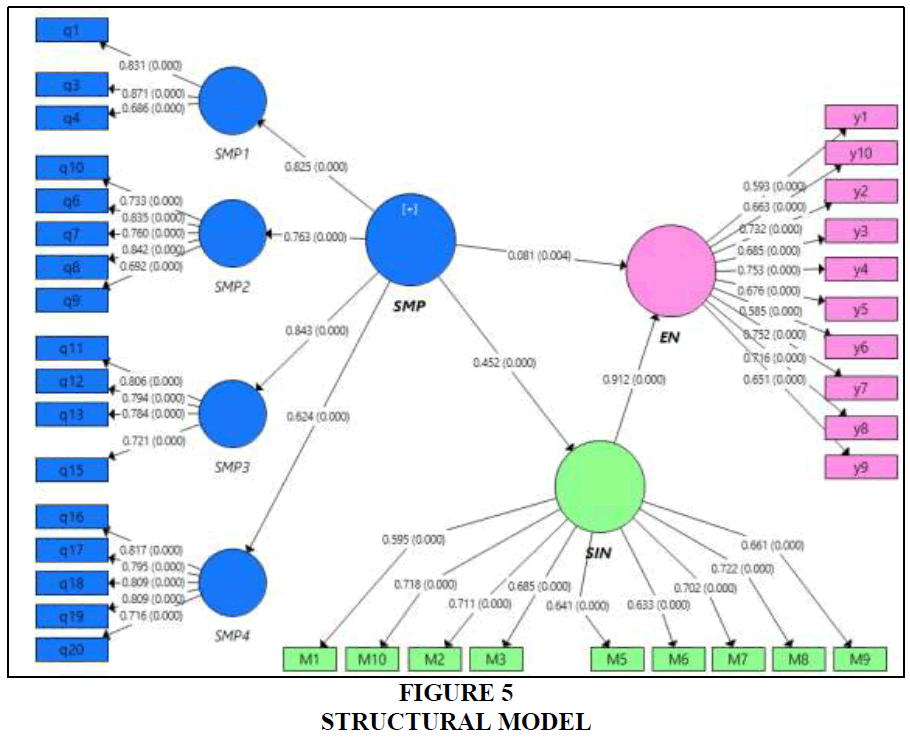Research Article: 2019 Vol: 18 Issue: 4
Impact of Strategic Management Practices on Organizational Entrepreneurship Mediating Effect of Strategic Intelligence
Khalidiya Mostafa Atta Abd, Iraqi University
Sami Ahmed Abbas, Iraqi University
Araden Hatim Khudair, University of Al-Mustansiriya
Abstract
Keywords
Environmental Scanning, Strategy Formulation, Strategy Implementation, Strategy Evaluation-Monitoring, SEM, SmartPls
Introduction
Today, universities try to survive and remain in a very competitive environment, so they are forced to look for tools, systems, models, processes; that allow making better decisions and raising the performance and promoting entrepreneurship. All these require universities to play an important role in achieving its academic goals and to take care of academic classification and ranking among the universities of the world and promote entrepreneurship (Patzelt & Shepherd, 2009). Entrepreneurship has become one of the most important issues of wide international interest due to the role it plays in economic and social development (Noe et al., 2017), in addition to its role in involving many social groups in economic activity (Kraakman & Hansmann, 2017). The decision undertaken by the leadership is always laid within the limits of the organization as per the strategies initial formulated. The effects of the strategic management practices on entrepreneurship stem from the original core values and mission of the organization. As the society changes and the dynamic nature of business world keep changing, the strategic reformulation is always undertaken regularly in response to any changes in the industry (Hitt & Duane, 2017). Strategic intelligence constitutes the provision of information and for strategic formulation. In the formulation of strategies, the goal of the organization is always to promote new innovative aspects, sustain the growth and possibly take the organization to a high notch in matters entrepreneurship in all sectors which need a successful management (Ansoff et al., 2019).
In the academic field management is increasingly becoming one of the most critical elements of human practice in many countries around the world, including Iraq. The practice is significant due to its direct social, economic, and political impact on the quality of Iraqi society (Blackburn, 2012). Consequently, investment in a good higher education plan is significant for the evolution of future societies and generations and requires extraordinary effort from management in the planning as well as execution phases for the planned education (Nauffal & Nasser, 2012). In this regard, the conceptual idea of strategic management practices plays a key role in the development of the Iraqi educational process, and many researchers have explored it as a critical tool that prepares universities to respond to future scenarios and educational needs. Achieving organizational communication in university education requires reliance on advanced techniques, mechanisms, and strategies, including strategic intelligence, which used by entrepreneurs as a tool that helps in strategic planning, decision-making, and evaluation. The main problem of this study is identifying the impact of strategic management in organizational entrepreneurship with the mediation role of strategic intelligence.
Accordingly, this research aims to answer the question of investigation: what is the impact of strategic management on organizational entrepreneurship with the mediation role of strategic intelligence.
Literature Review
Strategic Management Practices
Strategic management is considered as one of the major tools of success in an enterprise. It is the systematic maintenance and structuring of success potentials in the enterprise. Strategic management aligns external factors and the internal factors that affect an enterprise. The internal factors bring the strengths and weaknesses in an enterprise while the external factors bring opportunities and threats in the enterprise (Hitt & Duane, 2017). Strategic management incudes environment scanning, strategy formulation, strategy implementation, and strategy evaluation (Ramadan & Borgonovi, 2016).
Environmental scanning is the act of surveying and interpreting relevant data in a bid to explore both internal and external opportunities as well as external threats in a business venture (Smeltzer et al., 1988), strategic formulation encompasses the process of choosing the most appropriate action plan or in other words the next course of action in order to achieve the set objectives (Pearce et al., 2000). Immediately after strategic formulation, the next move is to implement strategies and take a closer look at how things pan out. Rapert et al. (2002) defined strategic implementation as the act of putting strategies, plans, and ideas into action and evaluate to see if the desired goals were arrived at. Finally, strategy evaluation and monitoring aims at improving the management outputs by reviewing the effects of the formulated strategies (Ramadan & Borgonovi, 2016).
Strategic Intelligence
Strategic intelligence is a set of actions and activities used to find, analyze and evaluate all business information in order to achieve a certain set goal and it focuses mainly on issues pertaining strategic planning for a business (Sternberg, 2004).
Entrepreneurship
Entrepreneurship is the ability, quality or ability to conceive and realize a business opportunity, it is a way of thinking, reasoning and acting linked to and stimulated by the search for business opportunities (Bridge & O’Neill, 2012). Successful entrepreneurs exploit opportunities that have not been identified by competitors.
Material and Methods
Research Model and Hypotheses
Based on the literature and previous studies, the main dimensions of this research were identified. Figure 1 shows the study model showing the independent variable within the Strategic Management Practices (SMP) which includes Environment Scanning (ES), Strategy Formulation (SF), Strategy Implementation (SI), and Strategy Evaluation (SE)), the mediating variable is Strategic Intelligence (SIN), and the dependent variable is Entrepreneurship (EN). In order to test the relationships, the following hypotheses have been developed:
H1: Strategic management practices have a positive impact on strategic intelligence.
H2: Strategic intelligence positively affects entrepreneurship.
H3: Strategic management practices positively affect strategic intelligence.
H4: It is expected that the relationship between strategic management practices and entrepreneurship will be mediated by strategic intelligence.
Research Design and Procedure
This research is based on Structural Equation Modeling (SEM) in order to study the relationships assumed in the research model and test hypotheses that have been developed. Data collected by tools of the questionnaire. The random sample was used and the data were analyzed using the five-dimensional Likert scale. The conceptual validity of the instrument was based on previous studies and related literature, as well as the views of a sample of experts. The reliability analysis of this instrument showed Cronbach Alpha of 0.937. Values above 0.80 have high reliability. The populations of this study were professors in Iraqi universities in Baghdad. Sample selection was conducted among them.
Results
Measurement Model
The Confirmation Factor Analysis (CFA) was performed to verify the properties of the instrument elements.
Figure 2 shows the goodness of valid indicators in the evaluation of this sample study selected to SM. Since CFA model were not acceptable, three elements (q2, q5, and q14) were deleted for an appropriate measurement model (Table 1). The revised CFA results indicated that (chi-square=427.565(p<0.05), (x²/df=427.565/103=4.151); threshold less than 5, the incremental containment (IFI=0.901), the Tucker-Lewis index (TLI=0.879), the (CFI=0.956), (GFI=0.908), (AGFI=0.902), and the RMSEA square root square error of 0.078 (RMSEA<0.08). Based on these measurement indexes, the model seemed to fit well (Henseler & Sarstedt, 2013).
| Table 1 Result of Measurement Model | |||||
| Path | Original Sample (O) | Sample Mean (M) | Standard Deviation (STDEV) | T-Statistics (|O/STDEV|) | P-Values |
| SMPà SIN | 0.452 | 0.456 | 0.063 | 7.134 | 0.000 |
| SINàEN | 0.912 | 0.914 | 0.02 | 46.072 | 0.000 |
| SMPàEN | 0.081 | 0.08 | 0.026 | 3.121 | 0.002 |
| SMPàSINàEN | 0.4520912=0.412 | 0.417 | 0.058 | 7.131 | 0.000 |
| R2 | 0.904 | ||||
| R2-Adj | 0.903 | ||||
Regarding SIN Figure 3 indicated that CFA model did not acceptable fit, one element (M4) was deleted for an appropriate measurement model. The results indicated that (chi-square =19.574 (p<0.05)). The other indicators were (x2/df=1.305), (IFI=0.993), (TLI=0.981), the (CFI=0.992), (GFI=0.976), (AGFI=0.927), and the RMSEA 0.042 (RMSEA<0.08). Accordingly, the model seemed to fit well.
As for EN Figure 4 indicated that CFA model provided an acceptable fit. (Chisquare= 22.78 (p<0.05)). The other indicators were (x²/df =1.340), (IFI=0.993), (TLI=0.980), (CFI=0.992), (GFI=0.976), (AGFI=0.921), (RMSEA=0.044). Accordingly, the model seemed to fit well.
Structural Model
To examine whether strategic intelligence mediates the relationship between strategic management practices and entrepreneurship we used (SEM). Table 1, Figure 5 indicates a SEM analysis that showed that the effect of SMP is positive on SIN. The direct effect coefficients were (β=0.452, t=7.134, p=0.000); Thus, H1 was supported. Also, SIN positively affects EN where (β=0.912, t=46.072, p=0.000); hence H2 was supported. Similarly, H3 was supported with (β=0.081, t=3.121, p=0.002) which proved positive weak effect of SMP on EN.
Lastly, the indirect effect of SMP on EN through the mediation of SIN is positive, were (β=0.412, t=7.131, p=0.000); Thus, H4 was supported. In addition, the R² for the model is 0.904, indicates that SMP explains 90.3% of variance in EN.
Accordingly, the effect of strategic management practices on entrepreneurship is more effective when using strategic intelligence as a mediator which changes from (0.081 to 0.412).
Discussion
From the literature, we have established the need for universities to develop their entrepreneurship, which is now at the heart of the competitiveness. The main objective of this study was to identify the mediating effect of strategic intelligence in the relationship between strategic management practices and entrepreneurship.
Several studies have sought to relate these variables. Although these disciplines have separate histories, their relationship brings effect on entrepreneurship (Gillis et al., 2018). In entrepreneurship, strategic management is a combination of environmental scanning, strategy formulation, strategy implementation, and strategy evaluation and monitoring (De & Crispeels, 2018). These sub-divisions have a positive effect on entrepreneurship depending on the intelligence in which they are unleashed. Strategic intelligence is used by entrepreneurs as a tool that helps in strategic planning, decision-making, and evaluation. On the study of the effects of strategic intelligence on business decision-making McKie & Heath (2016) found that strategic intelligence helps to inform the decisions of the managers and help to success their plans.
Conclusion
The results indicated that strategic intelligence mediates the relationship between strategic management practices and entrepreneurship. Strategic intelligence and strategic management are supportive tools of entrepreneurship. Entrepreneurship is even inseparable from strategic management and strategic intelligence since without them many enterprise goals will not be achieved. Moreover, the research results on strategic management cannot be fully understood without including its effect on entrepreneurship. Strategic management involves identifying opportunities and exploiting them in a better way to create value to the enterprise which is also the aim of entrepreneurship.
References
- Ansoff, H.I., Kipley, D., Lewis, A.O., Helm-Stevens, R., & Ansoff, R. (2019). Implanting strategic management. Springer.
- Blackburn, W.R. (2012). The sustainability handbook: The complete management guide to achieving social, economic and environmental responsibility. Routledge.
- Bridge, S., & O’Neill, K. (2012). Understanding enterprise: Entrepreneurship and small business. Macmillan International Higher Education.
- De Moortel, K., & Crispeels, T. (2018). International university-university technology transfer: Strategic management framework. Technological Forecasting and Social Change, 135, 145-155.
- Gillis, W.E., Combs, J.G., & Yin, X. (2018). Franchise management capabilities and franchisor performance under alternative franchise ownership strategies. Journal of Business Venturing.
- Henseler, J., & Sarstedt, M. (2013). Goodness-of-fit indices for partial least squares path modeling. Computational Statistics, 28(2), 565-580.
- Hitt, M., & Duane Ireland, R. (2017). The intersection of entrepreneurship and strategic management research. The Blackwell Handbook of Entrepreneurship, 45-63.
- Kraakman, R., & Hansmann, H. (2017). The end of history for corporate law. In Corporate Governance (pp. 49-78). Gower.
- McKie, D., & Heath, R.L. (2016). Public relations as a strategic intelligence for the 21st century: Contexts, controversies, and challenges. Public Relations Review, 42(2), 298-305.
- Nauffal, D.I., & Nasser, R.N. (2012). Strategic planning at two levels. Planning for Higher Education, 40(4), 32.
- Noe, R.A., Hollenbeck, J.R., Gerhart, B., & Wright, P.M. (2017). Human resource management: Gaining a competitive advantage. New York, NY: McGraw-Hill Education.
- Patzelt, H., & Shepherd, D.A. (2009). Strategic entrepreneurship at universities: Academic entrepreneurs’ assessment of policy programs. Entrepreneurship Theory and practice, 33(1), 319-340.
- Pearce, J.A., Robinson, R.B., & Subramanian, R. (2000). Strategic management: Formulation, implementation, and control. Columbus, OH: Irwin/McGraw-Hill.
- Ramadan, M., & Borgonovi, E. (2016). Strategic management practices as a key determinant of superior Non-Governmental Organizations Performance. Problems of Management in the 21st Century, 11(2), 71-92.
- Rapert, M.I., Velliquette, A., & Garretson, J.A. (2002). The strategic implementation process: evoking strategic consensus through communication. Journal of Business Research, 55(4), 301-310.
- Smeltzer, L.R., Fann, G.L., & Nikolaisen, V.N. (1988). Environmental scanning practices in small business. Journal of Small Business Management, 26(3), 55.
- Sternberg, R.J. (2004). Successful intelligence as a basis for entrepreneurship. Journal of Business Venturing, 19(2), 189-201.




